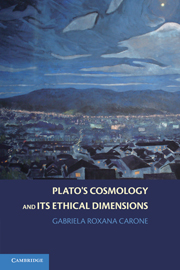Book contents
- Frontmatter
- Contents
- Preface
- Plato's Cosmology and Its Ethical Dimensions
- 1 Introduction
- 2 Demiurgy in the Timaeus
- 3 Cosmic God and Human Reason in the Timaeus
- 4 Creating Mixtures in the Philebus
- 5 Happiness in the Universe of the Philebus
- 6 Reversing the Myth of the Politicus
- 7 Cosmic and Human Drama in the Politicus
- 8 Laws X: First Causes and the Origin of Evil
- 9 Conclusion
- Notes
- Bibliographical References
- Index Locorum
- General Index
6 - Reversing the Myth of the Politicus
Published online by Cambridge University Press: 10 May 2010
- Frontmatter
- Contents
- Preface
- Plato's Cosmology and Its Ethical Dimensions
- 1 Introduction
- 2 Demiurgy in the Timaeus
- 3 Cosmic God and Human Reason in the Timaeus
- 4 Creating Mixtures in the Philebus
- 5 Happiness in the Universe of the Philebus
- 6 Reversing the Myth of the Politicus
- 7 Cosmic and Human Drama in the Politicus
- 8 Laws X: First Causes and the Origin of Evil
- 9 Conclusion
- Notes
- Bibliographical References
- Index Locorum
- General Index
Summary
So far I have argued that there is a tendency, in the late dialogues, to emphasise the teleological arrangement of the cosmos as one in which intelligence prevails. In this context, it is possible to see how the universe can provide a framework for the realisation of human autonomy, if now it is no longer expected, or required, that the individual should be under the rule of a gifted sage in order to attain happiness. Instead, by studying and imitating the rational consistency that pervades astronomy and mathematical disciplines in general, he can find and internalise models for his own behaviour, and be encouraged to explore his identity within that larger picture. This move towards the education of the many, who are no longer expected blindly to follow an authority, seemed to contrast with the Republic, and promised to pervade Plato's thinking in his later years as a mark of positive philosophical development. However, the Politicus confronts us with a problem in this respect – or, rather, with many problems.
First, it is not clear what the function of its cosmological myth is in relation to the overall political argument of the dialogue; at any rate the prevalent tendency has been to read that myth (by contrast with the dialogues we have so far considered) as suggesting that the universe is not under the control of god.
- Type
- Chapter
- Information
- Plato's Cosmology and its Ethical Dimensions , pp. 124 - 145Publisher: Cambridge University PressPrint publication year: 2005

